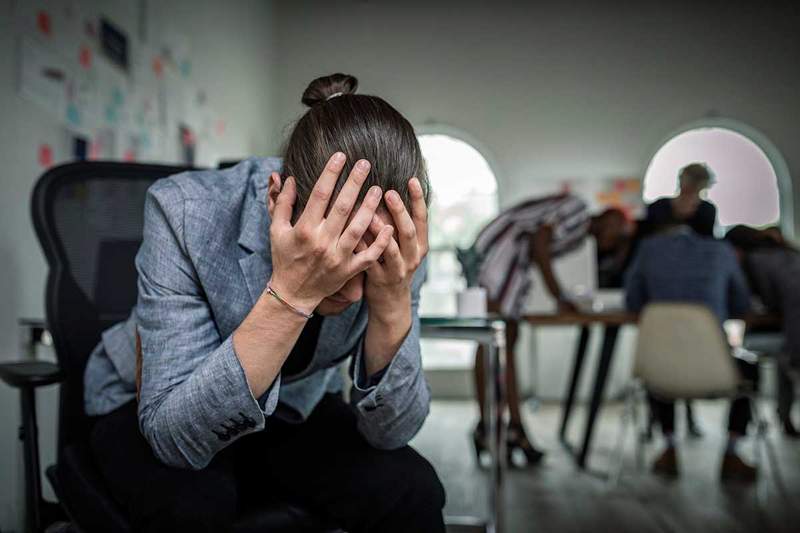Anxiety Do not allow you to dominate your life

- 3618
- 1109
- Charles Fay
Anxiety to many of us accompanies us in our day to day. It is a sensation that is definitely not defined as pleasant. Therefore, in this article we will provide you with strategies to be able to cope with states of anxiety and thus recover well -being.
Learn to give rise to your anxiety without allowing you to take the reins of your life. To find out, stay here!
Content
Toggle- What is anxiety
- Symptoms
- Normal and pathological anxiety
- 5 tips to prevent anxiety from dominating your life
- Conclusion
- Sources
What is anxiety
Following the American Psychology Association (APA), anxiety is defined as “an emotion characterized by feelings of tension, thoughts of concern and physical changes such as the increase in blood pressure”. We identify anxiety as a displaced emotion, which usually presents itself when anticipating future situations, being stimulated by real or imaginary hazards. It should be noted that Not only are human beings experience it, but it is also common among animals.
If I had to reduce the description of anxiety to a couple of words, I would definitely say discomfort and displeasure. However, in the most everyday cases, anxiety is not dangerous. Its function is to alert us of emotional hazards, being able to appear in very diverse situations.
Anxiety should not be confused with a diagnosis, because it is the first manifestation of something else, a sign that alerts, there is something that is generating it and to be able to diagnose it must effectively reach that which causes it.
They could like readers at this point wondering what are the differences between fear and anxiety, since their description so far is quite similar. But, as you can expect, they are not synonyms and it is important not to confuse them.
Fear results when noticing a known, real danger. For example, fear spiders because they can bite me. On the other hand, anxiety is result from perceiving an unknown and not necessarily tangible danger (although it could be) as a spider that I fear. They can generate anxiety social meetings, since it intrigues me how others will behave. In general, anxiety is felt in situations that, being objective, are not dangerous. A person suffering from a phobia to a certain object or animal contemplates excessive danger, when it is not. Who feels anxiety considers that danger is greater than what really is.
Symptoms
When perceiving a danger, anxiety symptoms manifest in a varied and, usually combined with each other. At the physiological level, palpitations, sweating, muscle tension, drowning sensation, dizziness are given. On emotional level it is presented as negative and obsessive thoughts, excessive concerns, difficulty concentrating and making decisions. At the behavioral level, lack of control in reactions is experienced, difficulty reconciling sleep, many people also manifest "not being able to swallow a single bite".
These are simply the most common symptoms of finding when feeling anxiety, there is an endless list of them. It is important to keep in mind that these They manifest differently according to the person, being able to occur together or individually, combining in different ways depending on who is or what is the situation.
 Separation anxiety disorder, what is it
Separation anxiety disorder, what is it Normal and pathological anxiety
Anxiety is a normal reaction among human beings and, by itself, it is not pathological. However, it could become pathological in some cases, so that normal and pathological anxiety concepts must be differentiated.
We can talk about a "healthy anxiety" if it serves to avoid a problem and does not influence this effort to negatively avoid it in other aspects of the life of each one, it responds to a stimulus and its duration is according to it.
On the other hand, anxiety will be pathological if it affects us in an excessive way, generating severity symptoms, invading our thoughts and becoming unable to find an answer or solution such as normal anxiety, pathological anxiety responds to a stimulus (which should not necessarily must being real) and its duration is not according to it.
5 tips to prevent anxiety from dominating your life
So far we define anxiety, its symptoms and differentiate a normal anxiety from a pathological. But, as previously clarified, anxiety is the most normal and all (to a greater or lesser extent) we suffer from it. Here I will give you some tips on what to do when we feel anxious or anxious, so as not to allow anxiety to seize us and dominate our lives.
Feeling anxiety can be useful:
- To do physical exercise: move the body, in any way and how more comfortable feel. Walk, ride a bike, run, dance, the important thing is to release accumulated energy. Exercise helps stimulate brain chemical substances that will generate well -being and help reduce the feeling of anxiety.
- Sleep and eat properly: Good night and a balanced diet, abundant in water, proteins, fruits and vegetables will allow physical well -being that will have a mental well -being.
- Perform respiratory exercises: they will help stimulate the nervous system and bring a feeling of calm. Inhale deep and exhale, the number of times they are necessary. You will notice that when concentrating on your breathing you will get negative thoughts and will allow you to think more clearly.
- Spend time: friends or family, share time with people close to us will help us cope with anxiety, distracting us from harmful thoughts. It will generate sensations of containment and security, it is necessary to feel accompanied, and it is also extremely beneficial.
- Think positive: Enlist the good things that happen to us, concentrate on it. Think about what we like to do, imagine happy scenarios. They are simple strategies that will help replace harmful ideas with other positive ones and allow to dissipate the feeling of discomfort that generates anxiety.
Conclusion
Now, the next time you feel a symptom of anxiety, you can say goodbye. Take your time, use some of the strategies of this article, you will see how with time and calm you can recover the well -being and get rid of the harmful thoughts that harm.
Let's put aside the taboo, feeling anxiety does not imply suffering a pathology. It is extremely normal and all, to a greater or lesser extent, at some point we run into it. What is fundamental is to accept it, make it own and, from there in more, look for some solution to leave it behind.
Sources
- González Martínez, M. T. (1993). Approach to the concept of anxiety in psychology: its complex and multidimensional character.
- López, o. Yo. F., Hernández, b. J., Almirall, r. B. TO., Molina, d. S., & Navarro, J. R. C. (2012). Manual for diagnosis and treatment of anxiety disorders dra. Odalis Fernández López, (1) Dra. Bárbara Jiménez Hernández, (2). Medisur, 10(5), 466-479.
- TRICKETT, s. (2012). Exceeds anxiety and depression. European Hispanic Editorial.
- « Academic Burnout Syndrome in Medicine Students Is it really a problem?
- 100 phrases of humility that will make you reflect »

